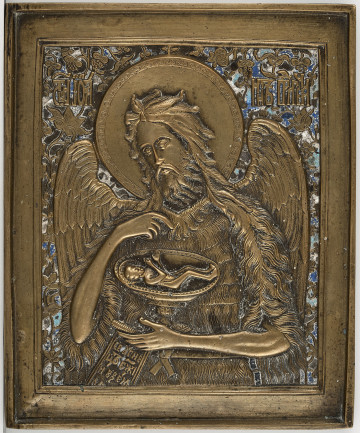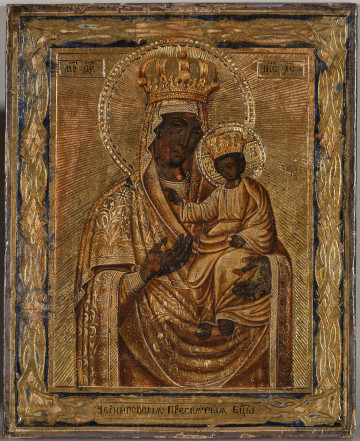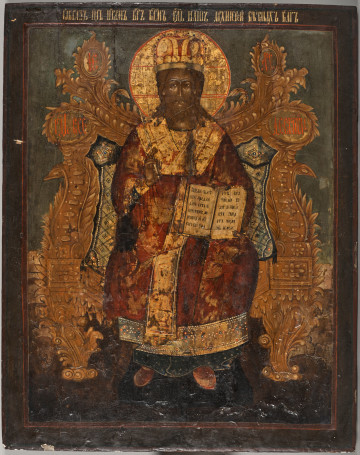
St. John the Baptist
20th century
Castle Museum in Łańcut
Part of the collection: Icons
The Ascension of the Lord, and in the Rus tradition 'Wozniesienije Gospodnie', is one of the most important feasts of the liturgical year, is closely connected to the Resurrection, and belongs to moveable feasts. Most Christian Churches celebrate it on a Thursday - forty days after the Resurrection Sunday (in the Roman Catholic Church, it was moved to the seventh Sunday after the Resurrection). In Rus, along with the formation of the multi-panel altar partition known as the iconostasis, the icon depicting the Feast of the Ascension was placed in the tier of the twelve Great Feasts of the liturgical year. The Ascension of Christ was confirmed in the New Testament, the Gospels of Mark (Mark 16:19) and Luke (Luke 24:50-51), as well as in the Acts of the Apostles (Acts 1:9-11). Christ, leaving the Holy Church he established on earth, departed for the Mount of Olives, blessed the Apostles who accompanied him, and ascended to Heaven. The rules of representing the Ascension formed around the 5th c., when the feast was separated out from the period of the Pentecost, which encompasses the time from the Resurrection to the Descent of the Holy Spirit. In the upper part, the two-panel icons of the Ascension depict Christ giving a blessing with both his hands, usually seated on a rainbow, on the background of an aureola supported by two angels, which is known as the mandorla. The lower part of the portrayal depicts the earthly Church, whose mother is the Mother of God, and whose foundation are the Apostles. The number of the Twelve Apostles, like the Twelve Tribes of Israel, signifies wholeness and perfection of the Church praying together with the Mother of God to the Triune God. This is why, on the icons of the Ascension of the Lord, there is also the depiction of St. Paul: although he converted after the Ascension, he takes an active part in the building of the Church community. On the displayed icon, as on other late portrayals, the composition of the Ascension of the Lord was simplified. Teresa Bagińska-Żurawska https://orcid.org/0000-0002-9243-3967
Dimensions
height: 22.8 cm, width: 15.4 cm
Object type
Icons
Technique
gilding, tempera
Material
gold, tempera, wood
Origin / acquisition method
decyzja administracyjna
Creation time / dating
Creation / finding place
Owner
Castle Museum in Łańcut
Identification number
Location / status

20th century
Castle Museum in Łańcut

19th (?) century
Castle Museum in Łańcut

1800 — 1850
Castle Museum in Łańcut
DISCOVER this TOPIC
National Museum in Szczecin
DISCOVER this PATH
Educational path